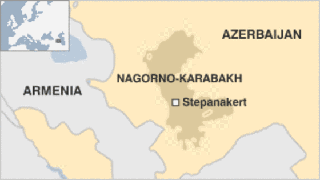The Nagorno-Karabakh situation, whereby a territory that the UN recognizes as part of Azerbaijan is under the control of an unrecognized autonomous government backed by Armenia, has sat unresolved and rarely spoken of for 22 years. The resumption of hostilities this weekend, however, comes just days after Secretary of State John Kerry spoke to Azeri President Ilham Aliyev, calling for an “ultimate resolution” to the conflict.
 Kerry made it clear he wanted a diplomatic settlement, but that still doesn’t mean his comments didn’t play a role in precipitating these new hostilities, if it convinced Aliyev that the US isn’t going to allow the status quo to remain in place.
Kerry made it clear he wanted a diplomatic settlement, but that still doesn’t mean his comments didn’t play a role in precipitating these new hostilities, if it convinced Aliyev that the US isn’t going to allow the status quo to remain in place.
The Nagorno-Karabakh situation is complex, but the US interest seems primarily in resolving it to spite Russia, seeing Russia as using the standoff as leverage to keep itself tied to both nations, particularly Armenia.
It”s clear the US sees a quick and clean resolution as undercutting Russian interests, but the dispute has a solid century of history underpinning it, and there is no practical “solution” that’s going to satisfy all parties. Hence, an end to the standoff is largely predicated on one side or the other imposing it militarily.
That’s a war that could rapidly spread far beyond Nagorno-Karabakh, however. Armenia has heavy Russian backing, and a significant Russian military presence for defensive purposes. The primary reason isn’t Azerbaijan itself, but Turkey, which is a close ally to Azerbaijan, doesn’t care for Armenia at all, and could quickly get involved if war breaks out.
Turkey”s involvement would all but oblige Russia to back Armenia, turning this into a major regional war. Turkey’s NATO membership could rapidly escalate it even further. The US isn’t necessarily anti-Armenia, but has major business interests in Azerbaijan’s energy sector which would likely oblige them to back Turkey’s play.
The 22-year status quo didn’t really satisfy anyone or open a path for resolution, but may have been better than the alternative, a dangerous and costly war.


